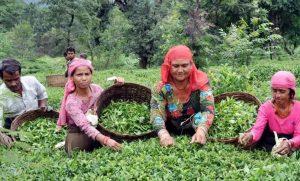
The European Commission (EC) has awarded protected geographical indication (PGI) status to Kangra tea, a unique variety of tea grown in the Kangra district of India’s Himachal Pradesh. The PGI will be effective from April 11, 2023, as per the notification issued by the EC on March 22. This move comes at a time when the EC has been delaying granting a similar status to Basmati rice, for which India applied in 2018. However, the EU wants India and Pakistan to hold discussions so that Basmati rice from Pakistan can also be recognized, but Pakistan is currently not meeting the necessary requirements for the recognition.
Advantages: The tag will help Kangra tea to get an opportunity to enter the European market.
Buy Prime Test Series for all Banking, SSC, Insurance & other exams
History of Kangra tea
- Kangra tea has a rich history that dates back to the mid-19th century, when it was first introduced in the Kangra district of Himachal Pradesh. The British colonial authorities were interested in developing tea plantations in India, and in 1852, Dr. Jameson, a British civil surgeon, planted tea seeds in the Kangra valley.
- The Kangra tea industry flourished in the late 19th century, and Kangra tea became famous for its unique flavor and aroma. In 1882, the Kangra tea estate won a gold medal at the Calcutta Exhibition, which further boosted its reputation.
- However, the industry suffered a setback in the early 20th century, when a blight known as “orange rust” destroyed many of the tea plantations. The industry never fully recovered, and it went into decline after India gained independence in 1947. According to the Tea Board, Kangra tea is a little milder than Darjeeling tea in terms of flavour and has more body and liquor.
About the European Commission (EC):
The European Commission (EC) is the executive branch of the European Union (EU). It is responsible for proposing legislation, implementing decisions, upholding the EU treaties, and managing the day-to-day business of the EU. The Commission is composed of one representative from each of the 27 member states of the EU, who are appointed by their respective governments. The Commission President is elected by the European Parliament and appointed by the European Council.
The Commission is headquartered in Brussels, Belgium, and has a staff of around 32,000 people. Its work is organized into departments, known as Directorates-General (DGs), which are responsible for specific policy areas such as agriculture, competition, environment, and trade. The Commission’s role is to ensure that EU laws and policies are implemented correctly and that member states comply with EU regulations.
The European Commission also represents the EU in international negotiations, such as trade agreements and climate change talks. It works closely with the other EU institutions, such as the European Council and the European Parliament, to shape EU policies and legislation. The Commission’s decisions are subject to oversight by the European Court of Justice, which is responsible for interpreting and enforcing EU law.
Important takeaways for all competitive exams:
- Himachal Pradesh Capital: Shimla (Summer), Dharamshala (Winter);
- Himachal Pradesh Chief Minister: Sukhwinder Singh Sukhu;
- Himachal Pradesh Governor: Shiv Pratap Shukla.



 Indian Olympic Medal Winners List Till N...
Indian Olympic Medal Winners List Till N...
 Who is the Inventor of the Gramophone?
Who is the Inventor of the Gramophone?
 HS Dhaliwal Appointed New DGP Of Andaman...
HS Dhaliwal Appointed New DGP Of Andaman...
